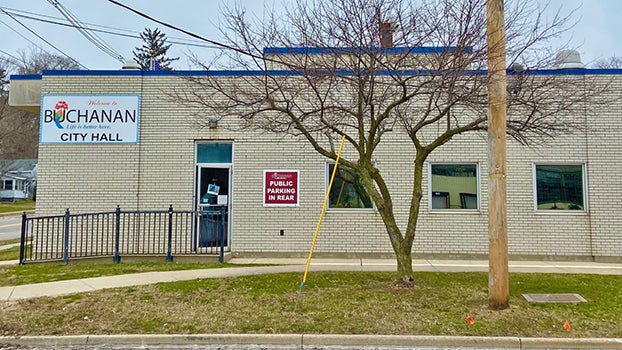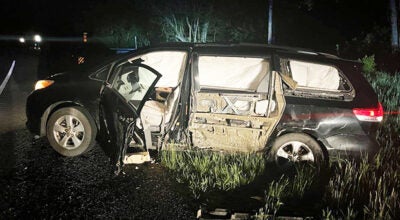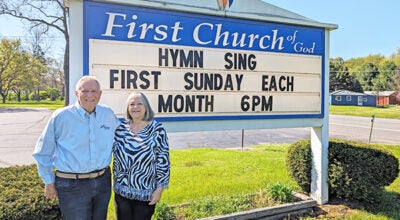Cass County cuts board of commissioners in half
Published 7:27 pm Thursday, April 21, 2011
CASSOPOLIS — Republicans’ plan for a seven-member Cass County Board of Commissioners approved 4-1 Monday by the Cass County Reapportionment Commission should save $589,943 over eight years, computes Treasurer Linda Irwin.
Irwin, Clerk-Register Barbara Runyon and Prosecutor Victor Fitz joined GOP Chairman William LaBre in adopting the seven-member plan for 2013 districts, while Democratic Chairman David Taylor preferred the five-member plan of which he was the architect.
“I will say that I’ve looked at seven, and seven is not unfair,” Taylor said.
The panel, which meets every 10 years to redraw political boundaries with new census data, adopted a plan which still splits Dowagiac between districts, but is “cleaner” in other parts of the county, Runyon said.
She and Fitz felt five members is too few. City Clerk James Snow spoke on behalf of seven. Commissioner Gordon Bickle, R-Porter Township, advocated nine.
Commissioner Charlie Arnold, R-Cassopolis, and a former Porter Township official favored retaining 15.
“Too small a board, you lose touch with your community,” Arnold said. “Right now, the board is about the right size. We’re very much in tune with our communities. We’re accessible and concerned about their concerns. Fifteen is the right size.”
But in the debate between money and better representation through smaller districts, cost considerations carried the day.
As someone who works with the 15 township clerks on elections, Runyon said, “If we have to have splits, I feel five is too small. Seven I like because Dowagiac’s split for two ballot styles looks like it’s right on Third Ward and won’t affect the others. Howard Township in the past, Precinct 2 had four commissioner districts. Now, one precinct will be in District 6 and the other two will be in District 5, so each precinct will deal with one ballot style, instead of messing with four as in the past. All the growth has been in the southern end of the county, so I can see why you would have to split Mason Township. Before, we had several (townships) with three commissioner districts: Calvin, Jefferson and Penn. For me, this is nice and clean. We should save money, too, just from ballot printing.”
LaBre devised his seven-member plan starting from concern the way “the county has been chopped” into 15 districts.
“It looks more like spaghetti than it does like districts over the last 10 years. One thing I wanted — and I came up with five, seven and nine playing with it — was not to break up the City of Dowagiac, no matter what I did. But I couldn’t get there because of these ‘floating’ things within the city because I had to make those contiguous with their townships. When we have little pieces with the city all around them, I couldn’t get there. Odds are I won’t be here in another 10 years, but if (Snow) could convince city fathers to annex these floating pieces, Dowagiac could have contiguous districts and not be broken at all.”
“Why I came up with seven,” LaBre continued, “I don’t want things too small. I thought five could get too ‘clique-y,’ with three dominating. Seven began me thinking about juries, which have even numbers (six to 12). County commissioner districts need an odd number” to prevent tie votes.
“District Court and Probate Court have six-member juries,” the attorney said. “That’s a reasonable kind of a number where small-group dynamics can work and yet fair verdicts or fair choices can come, but I can’t have six and five is too little, so seven is closest to decent dynamics. Edwardsburg is not broken. Cassopolis isn’t broken except for a little piece in Penn which has no population. Marcellus isn’t broken and Dowagiac almost isn’t broken. Things work with seven. Out of 16 political subdivisions — 15 townships plus the city — 12 aren’t broken at all. I didn’t think that was shabby and we’d save some money. The numbers Linda put together are startling.”
Irwin, who did not calculate savings from the five-member plan, shared the spread sheet which arrived at the $589,743 bottom line for 2003-2010, including $859,318.76 in salary, $66,290 for FICA, $8,012 for life insurance, $2,064 for worker compensation, $20,020 for per diem, $84,157 for travel, $60,255 for training and conventions, or $1.12 million total.
That translates into an average cost of $9,217 per commissioner per year, or an annual average of $138,267 for the entire 15-member board.
Seven commissioners per year based on the same figures would be $64,525, a savings of $73,742 per year, or $589,943 over the eight-year period for which figures are available.
“That’s a lot of money for a small county,” LaBre said. “With all those considerations, that’s why I came up with the seven-member districts. I couldn’t make nine work very well.”
With seven districts, District 2 and District 3 encompass the east side of Cass. The west consists of District 1, District 7, District 6, District 5 and most of District 4, distributing the county’s 52,293 population into districts of 7,057 to 7,869 constituents.
Statutes allow 11.9 percent deviation between the highest and the lowest.
With five commissioners, each district would contain 10,000 inhabitants, more or less.
Retired Fourth District Court administrator Diane Barrett-Curtis of Dowagiac agreed with five commissioners “there’s much more of a tendency to have little cliques. Seven will break that up and is an excellent compromise. I appreciate the work that you’ve done.
“It looks to me like everybody is very concerned about the size of the commission right now. I think it’s a gross waste of our resources and has been for the last 10 years. I’m here to express my displeasure at the current size of the commission.”
City Clerk James Snow, advocating for seven commissioners, said, “What department of Cass County doubled its size? What department of Cass County doubled its budget? Of course, it was the Board of Commissioners. Now the question that begs to be answered, did this increase double the effectiveness of the Board of Commissioners. My answer to you is no.
“In this economical crisis in the state of Michigan,” continued Snow, whose daughter, Cathy Goodenough, represents the Marcellus area, “revenue to the local units of government is just not there as in the past years. Increased taxes are not going to pass by the voters. Many experience this recession with loss of jobs, reduced income and difficulty in providing for their families. Hard decisions are being made right now — what do I really need? What can I really afford? And how am I going to make these changes?
“Having said that, I challenge you to consider a seven-member commission board that would represent the county in like manner as did the former board of the 1990s. The argument is made that there is opportunity for more representation. Yes, that is true, but at what level? Presently, the (more populated) west side of Cass County can control a decision of the board by a majority vote. Quite frankly, there is a tremendous difference in the west side and the east side of the county. By reducing the number of commissioners, the apportionment board could cluster like social, economical, business and transportation concerns into a commissioner district that would more fully represent all those elements of population in that particular district. In my opinion, that would be good representation,” Snow concluded.
“I don’t buy the cost savings,” said Paul Eugene “Jamie” Thompson, former Porter Township deputy clerk, who supports the 15-member board.
“We had two precincts, one with 2,700 registered voters. On average, 1,500 voted. In Precinct 2, we had only 600 registered voters, with 100 voters on average. The cost to the township to have that kind of division, with a small and a large number, was for five election people, not to mention of all the resources of printing ballots. My concern is no matter how you divide these districts, at least follow district lines and do not divide a community. Mr. Snow hit it on the head. Dowagiac has it worse than my township.”
As a Porter Township citizen, Thompson commented, “Fifteen commissioners is a great thing. We had a $17.1 million sewer project crammed down our throats that no one wanted. To this day, we are in financial despair because of it. I also think everybody here in the county can remember when we had seven. The voters shot down the Law and Courts Building and they said, ‘To heck with you’ and built it anyway.”
With population increasing, “There’s no reason to downsize,” Thompson said.
“This county has been well-served by having 15 commissioners,” Taylor said. “We have provided to the residents of the county tremendous levels of constituent services. We are roughly 3,500 people per commissioner, which enabled me when I was there as a commissioner to go to every single home, and I know my successor (Roseann Marchetti) has done the same thing. Counties around us, Van Buren and Berrien, are roughly 10,000 per commissioner. Kalamazoo, it’s about 14,000 per 17 commissioners, and they’re getting ready to cut it to nine or 11. We have been providing a heavier level of service than might be appropriate for the money it costs us. I looked at it much as Bill did: Let’s cut down on the break-ups of the townships, villages and the city. I started with the goal of zero splits and ran square into the same problem as Bill in the City of Dowagiac, so I have a split. Beyond that, the only other split in my plan of five is the Village of Cassopolis is split off from LaGrange, but it has its own election system, unlike Edwardsburg or Marcellus. Those are the only two splits that exist in my five-person plan. You’ve got four splits with seven.”
With 15 commissioners, Taylor conceded, “It’s very difficult trying to get them on the same page at the same time. I think it would be easier for five commissioners to work together.”
LaBre thanked Taylor. “If we could get our country and state to work together as well as you and I could, we wouldn’t have a whole bunch of the problems we’re facing.”
Officials watching the meeting included County Administrator Charles Cleaver, Animal Control Director Mike Grice, Water Resources Commissioner Bruce Campbell, Sheriff Joe Underwood, Commissioners Robert Ziliak, Carl Higley Sr., Gordon Bickel Sr., Charlie Arnold and Roseann Marchetti.
Each audience member was offered two minutes to comment.






